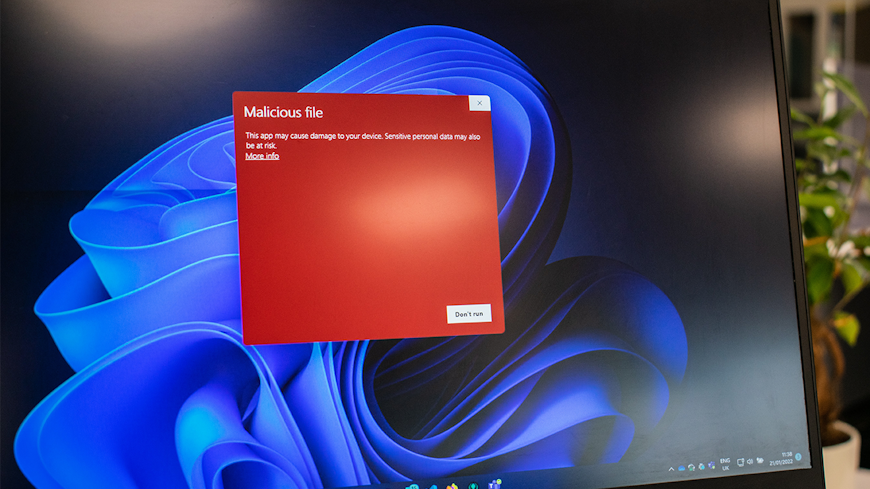Security packages can protect your PC from internet malware. Learn what you should look for, why premium and free software are both valid options, and how to decipher some jargon in our buying guide.
What is an internet security package?
We’ve used ‘antivirus’ to describe these products because people know what that means. But there’s more to security than just removing viruses – many products include extras such as firewalls, password managers and virtual private networks (VPNs).
It’s helpful to have a single suite that manages all your security needs with only one installation and, for premium products, one subscription to pay.
Macs need antivirus too
Even though fewer viruses target Macs, having an internet security package installed is just as important.
We found that the macOS operating system provides almost no built-in malware protection, with more reliance on the user to know what to block. Even a confident computer user can always make a mistake and allow the wrong program, so you should be proactive in keeping your hardware safe.
You don’t necessarily need to pay
Many packages are available in free and paid varieties. Both are legitimate choices, depending on your priorities.
Free version: Contains all the same basic functions and is just as secure. However, it will incessantly ask you to upgrade to the paid version and may also come bundled with extra programs you don’t need.
Premium version: Aside from removing ads, it will come with advanced features. Some, such as ransomware protection, are like insurance policies – not useful on a daily basis, but if you do need them, you’ll really need them. Others, such as password managers, are mostly for convenience or protecting against human error.

What kind of protection do you need?
If you partake in risky behaviour online, such as downloading pirated content from file sharing sites, gambling, or visiting adult sites, you should install a robust security package (which probably means paying).
If you’re not a confident internet user, you should also get a premium antivirus suite. Staying safe online relies on a certain level of savviness – if you don’t have that, you need the strongest safety net behind you.
If you’re confident and use the internet a lot, consider a free antivirus. The core protection is usually as good as the paid version, and you’re probably shrewd enough not to fall into the worst traps.
If you’re confident but don’t go online much, and you have a Windows PC, the built-in Windows Defender security features might give enough protection. Check our test results to see how Defender stacks up.
Features to look for
Phishing protection: An attacker tricking you into providing a password or other sensitive information – by impersonating another company, for example – is called phishing. Most security suites block phishing sites. Phishing is also done via email, so look for a package with email scanning as well.
Ransomware protection: This devastating type of malware steals and encrypts your data, only decrypting it once you pay a ransom (if you’re lucky).
Password manager: Generates complex, hard-to-guess passwords on demand and stores them in an encrypted database.
Multiple-device licences: Many premium programs have licence options that let you cover additional computers and devices, such as smartphones and tablets, across a range of operating systems including iOS and Android.
Parental controls (content filtering): Lets you block certain websites or specify keywords or content that will stop a page from loading if detected.
Pop-up and ad blocking: Clicking on ads (especially in pop-up windows) can expose you to viruses or intrusive adware.
Scan on install: Ideally, you’ll be installing on a virus-free computer. If you’re not sure, look for software that checks your computer for malware before or during installation.
Scheduled scanning: Lets you set the program to regularly scan specific folders.
System requirements: Check your computer meets the program’s recommended processing power and RAM. The software is running constantly, so if it’s too resource-hungry it’ll slow your machine to a frustrating crawl.
Game mode: Useful when playing online games in which speed is crucial, this mode tells the firewall to delay pop-ups, regular scans and updates until you’ve finished. Game mode can also be useful for streaming video or other demanding activities.
Cookie blocking: Cookies are small files that save personalised information about your activity on websites. They’re widely used and often helpful, but can be a privacy risk.
Resist the upselling!
When you buy a new computer, you might be offered an antivirus package such as McAfee or Norton as an optional add-on. While sorting out antivirus should be one of the first things you do with a new PC, we don’t think you should accept these offers.
Instead, you should weigh up all your options. Our test results can help you make an informed choice. For example, you might be able to get away with a free antivirus and not have to spend a cent.
Technical terms
Here’s some security terminology you may come across:
Adware
Software that delivers advertisements on your computer.
Banking protection
This prevents your computer sending data to other websites when it detects you’re using internet banking.
Botnet
Short for bot network, also known as a "zombie army", it’s a collection of infected internet-connected computers running unauthorised automated software (called robots or bots) that can distribute spam and viruses and launch attacks on computers or networks.
Firewall
A software program and/or hardware device that limits outside network access to a computer by blocking or restricting entrances (ports) to your computer.
Malware
A generic term for unwanted software that secretly executes unwanted actions.
On-access scanning
Constant monitoring of a computer’s memory and file system that activates automatically and scans any file (as it’s opened, closed or moved) to detect virus activity before it can infect the system.
On-demand scanning
Scanning of selected files as required by a user.
Phishing
Attempts to lure users to reveal credit card details, account passwords and personal information by pretending to be an email from a trusted financial institution or service.
Quarantine
The isolation of files suspected to contain a virus, so they can’t be opened or activated.
Ransomware
Ransomware is a particularly nasty type of malware that locks the data on your computer using encryption. It then displays a ransom message asking for payment to release your data. The reality is even if you pay the ransom, your data are unlikely to be released. Regular backups are the best means of recovery as you can roll back your data to before they were encrypted. However, security software is still needed to remove ransomware and protect your computer from further attacks.
Spam
Unsolicited (junk) email distributed on a large scale and often part of a scam.
Spyware
Software that secretly gathers information about a user from a computer.
Trojan
A malicious program hidden in a benign application. Often used by hackers to enable access to the victim’s computer.
Virus
A software program, script, or macro designed to infect, destroy, modify, or cause other problems with a computer or software program.



